新视野大学英语Book4-5课件
- 格式:ppt
- 大小:8.23 MB
- 文档页数:99

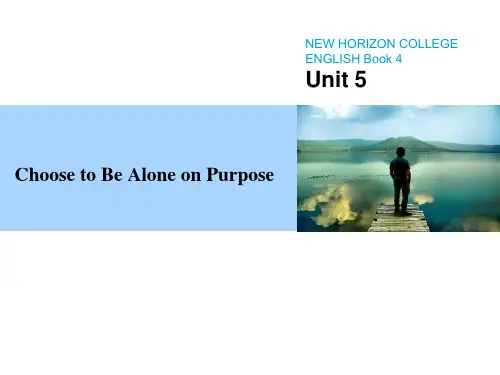

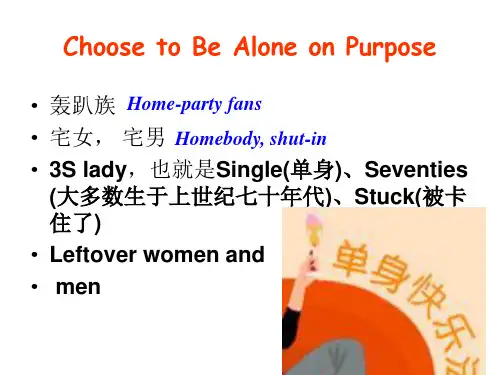
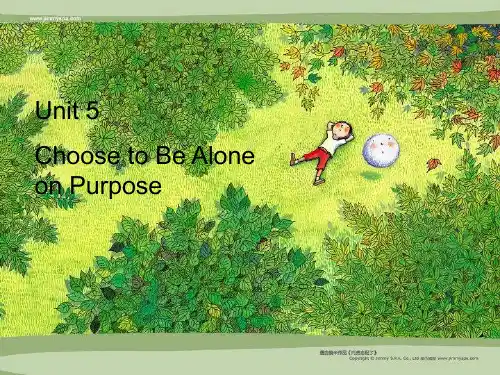

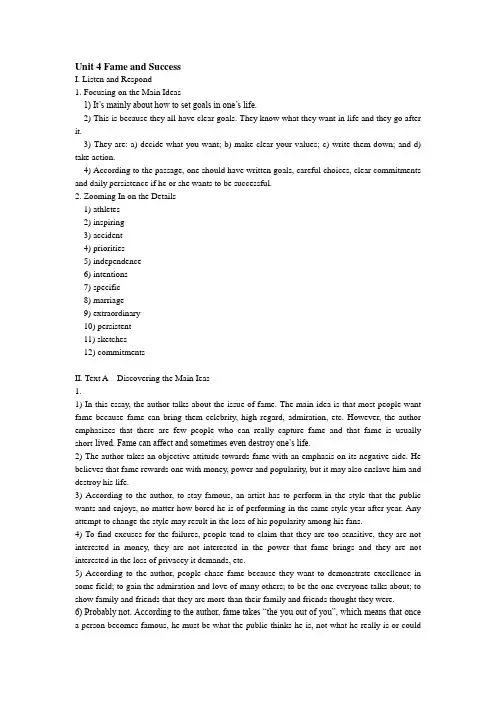
Unit 4 Fame and SuccessI. Listen and Respond1. Focusing on the Main Ideas1) It’s mainly about how to set goals in one’s life.2) This is because they all have clear goals. They know what they want in life and they go after it.3) They are: a) decide what you want; b) make clear your values; c) write them down; and d) take action.4) According to the passage, one should have written goals, careful choices, clear commitments and daily persistence if he or she wants to be successful.2. Zooming In on the Details1) athletes2) inspiring3) accident4) priorities5) independence6) intentions7) specific8) marriage9) extraordinary10) persistent11) sketches12) commitmentsII. Text A---Discovering the Main Ieas1.1) In this essay, the author talks about the issue of fame. The main idea is that most people want fame because fame can bring them celebrity, high regard, admiration, etc. However, the author emphasizes that there are few people who can really capture fame and that fame is usually short-lived. Fame can affect and sometimes even destroy one’s life.2) The author takes an objective attitude towards fame with an emphasis on its negative side. He believes that fame rewards one with money, power and popularity, but it may also enslave him and destroy his life.3) According to the author, to stay famous, an artist has to perform in the style that the public wants and enjoys, no matter how bored he is of performing in the same style year after year. Any attempt to change the style may result in the loss of his popularity among his fans.4) To find excuses for the failures, people tend to claim that they are too sensitive, they are not interested in money, they are not interested in the power that fame brings and they are not interested in the loss of privacey it demands, etc.5) According to the author, people chase fame because they want to demonstrate excellence in some field; to gain the admiration and love of many others; to be the one everyone talks about; to show family and friends that they are more than their family and friends thought they were.6) Probably not. According to the author, fame takes “the you out of you”, which means that oncea person becomes famous, he must be what the public thinks he is, not what he really is or couldbe. Fame enslaves him with what the public wants, instead of helping him maintain and develop his own identity or his true self.III. Text A---Reading Between the Lines1.According to the author, fame and the public attention that comes with it can destroy one’stalent. Once you become famous, it is not you but the public that controls your fate. You have to work and live in line with the public expectations.2.Artists are no longer the master of themselves. In order to meet the public demands, they haveto perform in the same style year after year, no matter how bored they become.3.Fame often affects how performers see their own talent and skills. It is easy for them tobelieve that they are as perfect as what the media describe. They may indulge themselves in that illusion and lose their own judgment about themselves.4.Once you become famous, your opponents will pay more attention to you and they will seekevery opportunity to challenge or even attack you. You will also be exposed to the limelight and the media may keep an eye on whatever you are doing.IV. Text B---Checking Your V ocabulary1.2) d 3) g 4) a 5) c 6) h 7) b 8) f2.1) (n.) a first university degree in any of several subjects(n.) an unmarried man2) (n.) the state of being free within society from oppressive restrictions imposed by authority onone’s way of life or behaviour(n.) too much freedom in behaviour, taken without permission and sometimes regarded as rude 3) (n.) the point of highest activity, quality or achievement(vi.) reach a highest point4) (n.) a very strong feeling of excitement or joy(vt.) cause to fell a sudden strong feeling of excitement or joy5) (n.) the amount of money that is available to a family to spend(vt.) bring (the lips) together in little folds6) (ad.) in the way that is typical of power that is uncontrolled and used without considering thewishes of others(ad.) in the way that is decided by or based on chance or personal opinion rather than facts or reason; randomly7) (vt.) make (sth.) certain to happen or be gained; ensure(vt.) tell firmly and with confidence, esp. with the aim of removing doubt; promise8) (n.) the management of money, esp. of large amounts of money by governments, companies, orlarge organizations(vt.) provide an esp. large amount of money for (a public activity or organization, business, etc.)V. Text B---Checking Your Comprehension1. NFinancial wealth, in fact, is a shallow measure of success. If we accept dollars as our standard, then “money is the measure of the man,” and what could be more foolish than that? (Para. 4) Such success cannot be measured in monetary terms. (Para. 10)2. Y…wealth is ill-measured by using mere dollars: … (Para. 3)What about a life well-lived? What about a family closely bound by love? Who could be wealthier than a man or woman whose calling provides benefits to mankind, or to fellow citizens, or even toa community or neighborhood? (Para. 4)3. Y… that fame is ill-measured by public notoriety; … (Para. 3)4. N… and that power is ill-measured solely by control over others. (Para. 3)5. NPerhaps the famed economist Joseph Schumpeter can help. Ambitious people are driven, he suggested, by “the joy of creating, of getting things done, of simply exercising one’s energy and ingenuity; and by the will to conquer, the impulse to fight, to succeed for the sake, not of the fruits of success”--- i.e. wealth, fame, and power--- “but of success itself.” (Para. 9)6. YSource sentences: Such success cannot be measured in monetary terms, nor in terms of the amount of power one may exercise over others, nor in the illusory fame of inevitably short-lived public notice. But it can be measured in our contributions to building a better world, in helping our fellow man, in bringing up children who themselves become loving human beings and good citizens. (Para. 10)VI. Text B---Optional Classroom Activities(The following explanations are provided only for references)1)As long as you have confidence in yourself, and hold the belief that anything is possible, youare already on your way to success.2)If you always close your eyes to possibilities, you will attempt nothing and accomplishnothing. Such a pessimistic attitude can never make a successful person.3)Successful people know their goals and would waste no time in pursuing them. If you believewhat you are doing now would lead you to success, the 10 million dollars might speed you up on your way to success but would not change what you are doing now.4)Education and talent are important factors in achieving success, but they can never take theplace of perseverance. On your way to success, the biggest obstacle is not the lack of education or talent, but the lack of persistence and determination in what you are doing.Education and talent may help you to achieve success, yet only persistence and determination can give you the will power to stick to your goal and to overcome difficulties.5)The only answer is as much as it takes.VII. Enhance Your Language Awareness1.1) fortune2) dull3) chased4) launched5) finance6) reputation7) liberty8) publicity9) sufficiently10) sympathy11) target12) educate13) commerce14) alike15) bored16) audiences17) regard18) assure2.1) thrown out2) and so on3) for dear life4) dedicate himself to5) was tired of6) turn away7) hang on8) for the sake ofVIII. Increasing Your Word Power1) reached / secured2) achieved / attained3) attained / reached4) reach / secure5) achieved / realized / fulfilled6) fulfill / meet / satisfy3.2) competitive3) same4) momentary5) specific6) sufficient7) cruel8) humble9) famous10) reasonableIX. Grammar Review1.1) (real) subject (真正的主语)2) object to the verb “make” (动词“make”的宾语)3) predicate (谓语)4) attribute modifying “opportunity” (定语---修饰“opportunity”)5) object complement (宾语补足语)6) adverbial of purpose (目的状语)7) adverbial of result (结果状语)8) predicative (表语)9) attribute modif ying “person” (定语---修饰“person”)10) independent element (独立主格结构)2.1) To become a famous writer2) to take traveler’s checks3) to employ a young engineer4) take the machine apart5) To understand the situation completely6) to rise higher in position7) to find that the train had left 10 minutes before8) to apply for a known job opening9) to make trouble10) To be more exactX. Cloze1) chase2) reputation3) dedicate4) reward5) sufficiently6) measured7) assure8) Momentary9) celebrity10) target11) frank12) liberty13) illusory14) regardXI. Translation1.1) He attempted to save the enterprise which was on the verge of collapse but failed.2) The president has announced that he will not seek re-election at the end of his first term.3) The young teacher is skilled at motivating his students to study hard.4) She loves giving parties and does so whenever she can find an excuse.5) I’m afraid that you’ll have to compete with at least fifty people for an administrative post in this company.6) T o be frank, I don’t think you stand a good chance of getting promoted even if you are loyal to the company.7) It was obvious that his speech aroused the sympathy of the audience for the victims of the earthquake.8) Though he has repeatedly assured me of his ability to promote our company’s products, I’ll give him another interview before hiring him.9) The company’s investment ended in failure due to the wrong strategic decisions of the general manager and so the board of directors decided to throw him out.10) I know you are tired but try to hang on a little bit longer. We will reach the peak in half an hour.2.Many people want to be famous because fame can bring them both honor and respect from the public. In most cases, fame can also help them gain wealth. But, after all, very few people can really become famous while most people, including most artists, are unlikely to become famous.It is true that some failure for some people at certain times in their lives does motivate them to strive even harder so as to achieve final success. For example, Thomas Edison, the famous American inventor, had tried hundreds of materials before he finally found the suitable fuse for the electric bulb. However, unfortunately, for most people failure is the end of their struggle.Therefore, in my opinion, success is one thing and fame is another. As long as you have tried your best, you’re already successful whether you are famous or not.XII. Theme-Related WritingA Sample Essay:Fame--- Good or EvilFame has always been pursued by many people for the advantages it brings about. Fame can assure one of a high social status, high regard, great admiration, etc. Fame can also bring one wealth as a celebrity has more chances to earn big money. Besides, the applauses and flowers from the fans may boost one’s self-confidence and increase one’s sense of fulfillment.However, fame can ruin one’s life, too. It deprives one of his privacy. As a public figure, he is often chased by fans and journalists, and his priva te life never escapes the media’s attention or public curiosity. Fame also places one under great pressure. He has to work in line with public expectations and thus becomes the slave of his own success.So fame is a double-edged sword. I don’t seek fame and I don’t envy those who are famous. I highly appreciate what the American poet Henry Wadsworth Longfellow says about fame: “The talent of success is nothing more than doing well whatever you do without a thought of fame.”。


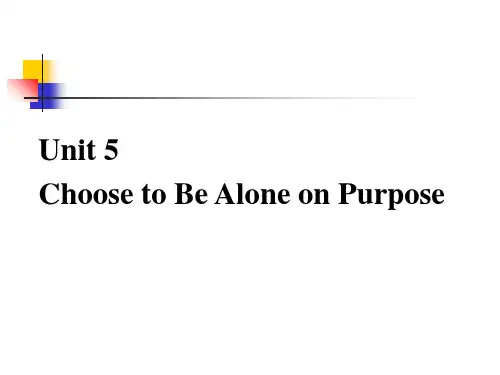

PreviewThe patterns of personal relationships are changing across the globe. Traditional families and friendships are giving way to more modern interrelationships. In the following articles, the writers present a range of practices that characterize this period of relational and familial change; living alone, sharing a room with others and arranged marriage. Passage A looks at two contrasting sides of solitude: the American hero or literary giant who chooses to be alone and how solitude is seen as promoting both a strong character and creative inspiration and, how individuals feel about and react to loneliness that is not of their own choosing. The second passage discusses the problems that can arise when college students have to share a dormitory with each other. Differences in preferred lifestyles can often lead to irritation and tension and can occasionally explode into violence. Passage C is a personal account of a USA educated Indian woman who, despite having taken on the Western value of individualism, still chose to be part of a traditional arranged marriage.Choose to Be Alone on PurposeHere we are, all by ourselves, all 22 million of us by recent count, alone in our rooms, some of us liking it that way and someof us not. Some of us divorced, some widowed, some never yet committed.Loneliness may be a sort of national disease here, and it's more embarrassing for us to admit than any other sin. On the other hand, to be alone on purpose, having rejected company rather than been cast out by it, is one characteristic of an American hero. The solitary hunter or explorer needs no one as they venture out among the deer and wolves to tame the great wild areas. Thoreau, alone in his cabin on the pond, his back deliberately turned to the town. Now, that's character for you.Inspiration in solitude is a major commodity for poets and philosophers. They're all for it. They all speak highly of themselves for seeking it out, at least for an hour or even two before they hurry home for tea.Consider Dorothy Wordsworth, for instance, helping her brother William put on his coat, finding his notebook and pencilfor him, and waving as he sets forth into the early spring sunlight to look at flowers all by himself. “How graceful, how benign, is solitude,” he wrote.No doubt about it, solitude is improved by being voluntary.Look at Milton's daughters arranging his cushions and blankets before they silently creep away, so he can create poetry. Then, rather than trouble to put it in his own handwriting, he calls the girls to come back and write it down while he dictates.You may have noticed that most of these artistic types went outdoors to be alone. The indoors was full of loved ones keeping the kettle warm till they came home.The American high priest of solitude was Thoreau. We admire him, not for his self-reliance, but because he was all by himself out there at Walden Pond, and he wanted to be. All alone in the woods.Actually, he lived a mile, or 20 minutes' walk, from his nearest neighbor; half a mile from the railroad; three hundred yards from a busy road. He had company in and out of the hut all day, asking him how he could possibly be so noble. Apparently the main point of his nobility was that he had neither wife nor servants, used his own axe to chop his own wood, and washed his own cups andsaucers. I don't know who did his laundry; he doesn't say, but he certainly doesn't menti on doing his own, either. Listen to him: “I never found the companion that was so companionable as solitude.”Thoreau had his own self-importance for company. Perhaps there's a message here. The larger the ego, the less the need for other egos around. The more modest and humble we feel, the more we suffer from solitude, feeling ourselves inadequate company.If you live with other people, their temporary absence can be refreshing. Solitude will end on Thursday. If today I use a singular personal pronoun to refer to myself, next week I will use the plural form. While the others are absent you can stretch out your soul until it fills up the whole room, and use your freedom, coming and going as you please without apology, staying up late to read, soaking in the bath, eating a whole pint of ice cream at one sitting, moving at your own pace. Those absent will be back. Their waterproof winter coats are in the closet and the dog keeps watching for them at the window. But when you live alone, the temporary absence of your friends and acquaintances leaves a vacuum; they may never come back.The condition of loneliness rises and falls, but the need to talk goes on forever. It's more basic than needing to listen. Oh, we all have friends we can tell important things to, people we can call to say we lost our job or fell on a slippery floor and broke our arm. It's the daily succession of small complaints and observations and opinions that backs up and chokes us. We can't really call a friend to say we got a parcel from our sister, or it's getting dark earlier now, or we don't trust that new Supreme Court justice.Scientific surveys show that we who live alone talk at length to ourselves and our pets and the television. We ask the cat whether we should wear the blue suit or the yellow dress. We ask the parrot if we should prepare steak, or noodles for dinner. We argue with ourselves over who is the greater sportsman: that figure skater or this skier. There's nothing wrong with this. It's good for us, and a lot less embarrassing than the woman in front of us in line at the market who's telling the cashier that her niece Melissa may be coming to visit on Saturday, and Melissa is veryfond of hot chocolate, which is why she bought the powdered hot chocolate mix, though she never drinks it herself.It's important to stay rational.It's important to stop waiting and settle down and make ourselves comfortable, at least temporarily, and find some grace and pleasure in our condition, not like a self-centered British poet but like a patient princess sealed up in a tower, waiting for the happy ending to our fairy tale.After all, here we are. It may not be where we expected to be, but for the time being we might as well call it home. Anyway, there is no place like home.Words: 937。